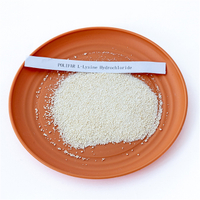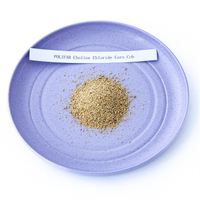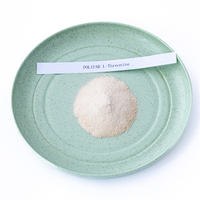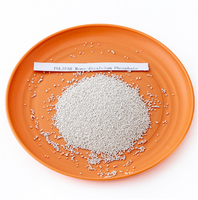| Availability: | |||||||||
|---|---|---|---|---|---|---|---|---|---|
| Color: Yellow or Orange Crystalline Powder Sales Models: wholesale Min Order: 10kg Shelf Life: Three years when properly stored Packing: Net weight 25kg per carton Storage: stockpiled at the ventilated place, avoiding rain, moisture and insolation. Please handle with care to prevent bag damage, store away from toxic substances. | |||||||||
Assay (on dry basis)/% 95.0~102.0
POLIFAR
293629
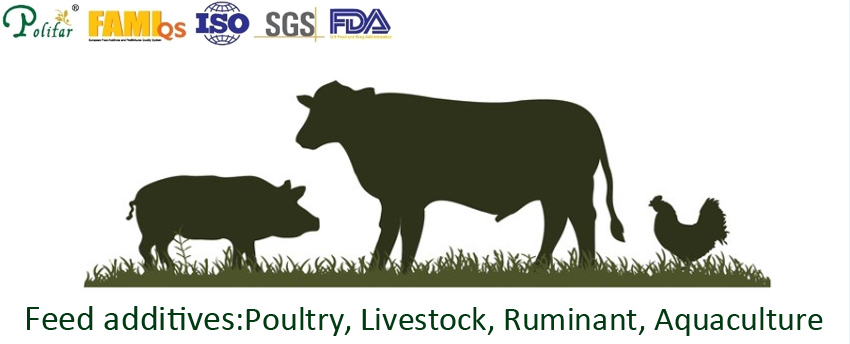
| CAS No.: | 59-30-3 | Other Names: | Folic Acid |
| Molecular formula: | C19H19N7O6 | EINECS No.: | 200-419-0 |
| Place of Origin: | China | Type: | Feed grade vitamin |
| Efficacy: | promote growth | Brand Name: | Polifar |
| Model Number: | feed additives | Appearance: | white powder |
| Shelf Life: | 2 years | MOQ: | 1000kg |
| Sample: | Free,≤500g |
【Product performance】:
Folic acid, also known as vitamin B9, is an essential nutrient for poultry that plays a critical role in various physiological processes. Here's a detailed introduction to folic acid for poultry:
DNA Synthesis and Cell Growth: Folic acid is crucial for the synthesis and repair of DNA, which is essential for cell growth and reproduction. This is particularly important for rapidly growing tissues in young poultry and for the maintenance of healthy cells in adult birds.
Red Blood Cell Formation: Folic acid is involved in the production of red blood cells. Adequate levels of folic acid in the diet are necessary to prevent anemia and ensure proper oxygen transport in the bloodstream.
Embryonic Development: During egg incubation, folic acid is important for the development of the embryo. It supports the growth of the embryo and helps prevent developmental abnormalities.
Immune Function: Folic acid is also linked to immune function in poultry. It supports the overall health and disease resistance of birds, helping them combat various pathogens and stressors.
Egg Production and Hatchability: Folic acid has been associated with improved egg production and hatchability in poultry, contributing to the overall reproductive success of the flock.

| CAS No.: | 59-30-3 | Other Names: | Folic Acid |
| Molecular formula: | C19H19N7O6 | EINECS No.: | 200-419-0 |
| Place of Origin: | China | Type: | Feed grade vitamin |
| Efficacy: | promote growth | Brand Name: | Polifar |
| Model Number: | feed additives | Appearance: | white powder |
| Shelf Life: | 2 years | MOQ: | 1000kg |
| Sample: | Free,≤500g |
【Product performance】:
Folic acid, also known as vitamin B9, is an essential nutrient for poultry that plays a critical role in various physiological processes. Here's a detailed introduction to folic acid for poultry:
DNA Synthesis and Cell Growth: Folic acid is crucial for the synthesis and repair of DNA, which is essential for cell growth and reproduction. This is particularly important for rapidly growing tissues in young poultry and for the maintenance of healthy cells in adult birds.
Red Blood Cell Formation: Folic acid is involved in the production of red blood cells. Adequate levels of folic acid in the diet are necessary to prevent anemia and ensure proper oxygen transport in the bloodstream.
Embryonic Development: During egg incubation, folic acid is important for the development of the embryo. It supports the growth of the embryo and helps prevent developmental abnormalities.
Immune Function: Folic acid is also linked to immune function in poultry. It supports the overall health and disease resistance of birds, helping them combat various pathogens and stressors.
Egg Production and Hatchability: Folic acid has been associated with improved egg production and hatchability in poultry, contributing to the overall reproductive success of the flock.
Testing Item | Standard | Yellow Crystalline Powder |
Appearance | Yellow or Orange Crystalline Powder | conforms |
Assay (on dry basis)/% | 95.0~102.0 | 97.60 |
Identification | A256/A365=2.80~3.00 | 2.843 |
Water/% | ≤8.5 | 8.21 |
Residue on Ignition/% | ≤0.3 | 0.19 |
Residue Solvents | Meets the Requirements | Meets the Requirements |
Cadmium | ≤1mg/kg | <1mg/kg |
Mercury | ≤1mg/kg | <1mg/kg |
Arsenic | ≤3mg/kg | <3mg/kg |
Lead | ≤2mg/kg | <2mg/kg |
Total Aerobic Plate Count | ≤250 CFU/g | 5 CFU/g |
Yeast and Mold Count | ≤100 CFU/g | <100 CFU/g |
Coliforms | ≤3.0MPN/g | <3.0MPN/g |
Salmonella | Negative/25g | Negative |
Testing Item | Standard | Yellow Crystalline Powder |
Appearance | Yellow or Orange Crystalline Powder | conforms |
Assay (on dry basis)/% | 95.0~102.0 | 97.60 |
Identification | A256/A365=2.80~3.00 | 2.843 |
Water/% | ≤8.5 | 8.21 |
Residue on Ignition/% | ≤0.3 | 0.19 |
Residue Solvents | Meets the Requirements | Meets the Requirements |
Cadmium | ≤1mg/kg | <1mg/kg |
Mercury | ≤1mg/kg | <1mg/kg |
Arsenic | ≤3mg/kg | <3mg/kg |
Lead | ≤2mg/kg | <2mg/kg |
Total Aerobic Plate Count | ≤250 CFU/g | 5 CFU/g |
Yeast and Mold Count | ≤100 CFU/g | <100 CFU/g |
Coliforms | ≤3.0MPN/g | <3.0MPN/g |
Salmonella | Negative/25g | Negative |
| Product Storage: | Stockpiled at the ventilated place, avoiding rain, moisture and insolation. Please handle with care to prevent bag damage, store away from toxic substances. |
| Product Packaging: | Net weight 25kg per carton |
| Delivery: | About 1 - 2 week |
| Product Storage: | Stockpiled at the ventilated place, avoiding rain, moisture and insolation. Please handle with care to prevent bag damage, store away from toxic substances. |
| Product Packaging: | Net weight 25kg per carton |
| Delivery: | About 1 - 2 week |
Q1: What is the use of folic acid in animal feed?
A1: Folic acid, also known as vitamin B9, is an essential nutrient for animals, just as it is for humans. It serves several important functions when included in animal feed:
1. Promotion of Growth and Development: Folic acid is crucial for cell division and growth, which is vital for the development of tissues and organs in animals, especially in young and growing animals.
2. Reproduction: Folic acid plays a significant role in reproductive health and fertility in animals. It is involved in DNA synthesis and repair, which are essential processes during reproduction and fetal development.
3. Prevention of Anemia: Folic acid is necessary for the production of red blood cells in animals. An adequate supply of folic acid in the diet helps prevent anemia, which can occur due to insufficient red blood cell production.
4. Optimal Metabolism: Folic acid is involved in various metabolic pathways, including amino acid metabolism and the synthesis of nucleic acids. It helps maintain optimal metabolic function in animals, contributing to overall health and vitality.
5. Immune Function: Folic acid is also believed to play a role in supporting the immune system of animals, although the exact mechanisms are not fully understood. A sufficient intake of folic acid may help animals better resist infections and diseases.
Q2: How is feed-grade folic acid different from folic acid for human use?
A2: Feed-grade folic acid may differ from folic acid for human use in several ways:
1. Purity and quality requirements: Feed-grade folic acid usually only needs to meet the basic standards for animal feed addition, while folic acid for human use requires higher purity and quality because the human body is more sensitive and requires higher standards to ensure safety and effectiveness. .
2. Additive use: Feed grade folic acid is mainly used in animal feed to supplement the animal's demand for folic acid. Folic acid is commonly used in humans as a vitamin supplement to prevent or treat folate deficiency.
3. Dosage: Folate dosages for humans are generally more precise than feed-grade folic acid dosages and will be adjusted based on an individual's age, gender, health status, and other factors. The dosage of feed-grade folic acid may be adjusted based on factors such as animal species and growth stage.
4. Regulatory standards: Folic acid for human use is subject to strict drug regulations and standards, while feed-grade folic acid is controlled by regulatory standards for animal feed additives, which may be less stringent than human drug standards in some aspects.
Q1: What is the use of folic acid in animal feed?
A1: Folic acid, also known as vitamin B9, is an essential nutrient for animals, just as it is for humans. It serves several important functions when included in animal feed:
1. Promotion of Growth and Development: Folic acid is crucial for cell division and growth, which is vital for the development of tissues and organs in animals, especially in young and growing animals.
2. Reproduction: Folic acid plays a significant role in reproductive health and fertility in animals. It is involved in DNA synthesis and repair, which are essential processes during reproduction and fetal development.
3. Prevention of Anemia: Folic acid is necessary for the production of red blood cells in animals. An adequate supply of folic acid in the diet helps prevent anemia, which can occur due to insufficient red blood cell production.
4. Optimal Metabolism: Folic acid is involved in various metabolic pathways, including amino acid metabolism and the synthesis of nucleic acids. It helps maintain optimal metabolic function in animals, contributing to overall health and vitality.
5. Immune Function: Folic acid is also believed to play a role in supporting the immune system of animals, although the exact mechanisms are not fully understood. A sufficient intake of folic acid may help animals better resist infections and diseases.
Q2: How is feed-grade folic acid different from folic acid for human use?
A2: Feed-grade folic acid may differ from folic acid for human use in several ways:
1. Purity and quality requirements: Feed-grade folic acid usually only needs to meet the basic standards for animal feed addition, while folic acid for human use requires higher purity and quality because the human body is more sensitive and requires higher standards to ensure safety and effectiveness. .
2. Additive use: Feed grade folic acid is mainly used in animal feed to supplement the animal's demand for folic acid. Folic acid is commonly used in humans as a vitamin supplement to prevent or treat folate deficiency.
3. Dosage: Folate dosages for humans are generally more precise than feed-grade folic acid dosages and will be adjusted based on an individual's age, gender, health status, and other factors. The dosage of feed-grade folic acid may be adjusted based on factors such as animal species and growth stage.
4. Regulatory standards: Folic acid for human use is subject to strict drug regulations and standards, while feed-grade folic acid is controlled by regulatory standards for animal feed additives, which may be less stringent than human drug standards in some aspects.





